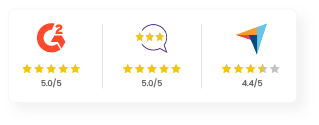Comparing Learning Platforms: A Deep Dive into Enthral and Docebo

Choosing the right learning and skilling platform can shape the way your organization learns, grows, and scales its people capabilities. Whether you are building training programs for employees, partners, or customers, the learning platform you select becomes the backbone of how that experience unfolds.
In the growing market of learning and skilling platforms, Enthral and Docebo have emerged as two popular options. Both bring unique capabilities to the table, yet they differ in approach, especially when it comes to automation, personalization, and emerging technologies like Agentic AI.
This platform comparison aims to give you a clear picture of Enthral vs Docebo, helping you make an informed choice based on your specific learning management needs.
Overview of Enthral and Docebo
Enthral is an Agentic AI-powered enterprise skilling platform, designed to support large-scale, complex learning environments. It blends structured learning workflows with intelligent automation to help L&D teams scale faster and smarter.
On the other hand, Docebo is a well-established Learning Management System (LMS) with a reputation for flexibility and extensive third-party integrations. It supports diverse learning scenarios—from formal courses to informal social learning—and caters to global organizations with strong customization and multilingual capabilities.
Both platforms are robust, but how they approach learning management workflows is where key differences emerge.
Feature-by-Feature Comparison: Enthral vs Docebo
Let’s break it down by specific feature categories.
Personalized Learning with AI
Enthral stands out with its integration of Agentic AI for skilling. Learners receive adaptive learning journeys driven by intelligent agents that simulate scenarios, coach users, and provide real-time feedback. This elevates the learning experience from passive consumption to active, contextualised practice. Enthral’s role-based agents like Lumina enable immersive learning through contextual feedback, simulations, and coaching, not just recommendations.
Docebo uses machine learning to power its content recommendations and automate enrolments. While it supports personalization, it doesn’t yet offer Agentic AI capabilities such as dynamic role play, AI coaching, or simulated decision-making environments.
So, if you are looking for next-gen personalization and intelligent coaching, Enthral pulls ahead with its Agentic AI engine.
Content Creation
Enthral makes content creation effortless with Kraft, its built-in AI agent designed for rapid authoring. Teams can generate and publish content across formats (videos, quizzes, PDFs, and more) without needing separate tools or specialist support. It’s a huge win for L&D teams looking to move fast without compromising quality.
On the other hand, Docebo only supports AI-driven content creation, offering tagging, auto-assessments, and content suggestions.
Both platforms offer AI support, but Enthral’s integrated approach with its AI agent makes it the faster, more versatile choice for scaling content.
Learning Management Workflows
Built to handle complex learning management workflows, Enthral supports advanced user segmentation, user-based progress tracking, and branching logic for assessments. The platform also makes it easy to build journeys across compliance, onboarding, and functional skilling, without overwhelming admin teams.
Docebo offers flexible workflows too, with automated enrolments, rules-based triggers, and an intuitive interface. However, some advanced configurations may require third-party integrations or custom development.
Both platforms are strong here, but Enthral edges out for large enterprises needing deeper workflow customization out of the box.
Admin Automation
Enthral automates everything from user onboarding to reporting with Maya, its Digital Platform Admin Agent. Maya handles day-to-day admin tasks, like enrolments, notifications, and generating reports, without manual effort. This frees up L&D teams to focus on driving learner outcomes, not just maintaining the platform.
Docebo leverages AI and workflow engines to automate repetitive tasks and streamline admin processes. Some setup may require additional configuration based on your plan.
While both platforms support automation, Enthral’s agent-led approach offers more hands-free execution, especially for L&D-heavy workflows.
Analytics and Reporting
Enthral provides actionable analytics focused on learning progress, skill proficiency, and behavioural engagement. It uses Agentic AI to surface insights on areas like learner drop-off points, making it easier for L&D to act quickly. With Maya, Enthral’s AI Admin Agent, L&D teams can generate insights automatically—without pulling reports manually.
Docebo includes dashboards and standard reporting features. Custom reporting is possible but may require some manual configuration or add-ons depending on your plan.
Enthral works better for its Agentic AI-driven insight and ease of actionability though both platforms well offer in their own areas.
Learner Experience
Enthral’s UI is clean and purpose-built for enterprise users. It supports both web and mobile-first experiences and allows learners to access simulated role plays, coach bots, and feedback loops in a single environment. Enthral delivers hyper-personalized experiences x10, using AI agents that not only recommend content but also capture learner goals, plan learning paths, and nudge completion through immersive coaching.
Docebo has a polished, user-friendly interface and supports a variety of learning modalities—videos, social learning, ILT, and more. The UX is highly customizable and consistent across devices.
Docebo may have versatility, but Enthral shines for modern, Agentic AI-powered skilling journeys.
Implementation, Support & Platform Flexibility
Enthral is designed for enterprise readiness. From onboarding to go-live, the platform offers dedicated support, custom onboarding journeys, and consultative assistance for structuring learning management workflows. It’s particularly well-suited for organizations with complex use cases such as multi-region rollouts, partner training ecosystems, or functional skilling initiatives. Enthral also provides continuous support to help L&D teams adapt as learning needs evolve.
Docebo offers a user-friendly setup with strong self-service options, documentation, and community forums. For customers on higher-tier plans, implementation support is available.
If you need tailored support for a complex rollout, Enthral is the better fit.
Agentic AI: Transforming Learning Management
What truly sets Enthral apart is its use of Agentic AI for skilling. Agentic AI goes beyond content curation or recommendation with AI agents that actively engage learners with simulated role plays, coaching bots that provide instant, contextual feedback and adaptive journeys based on performance data.
For learners, this means repeated, safe, and personalized practice at scale. For L&D teams, it is accelerated skilling without over-relying on live facilitators.
In contrast, while Docebo offers automation and some ML-powered features, it doesn’t yet support Agentic AI or intelligent agents as part of the learning flow.
Choosing the Right Platform for Your Needs
Selecting the best-fit learning and skilling platform depends heavily on your organization’s priorities. If your focus is impactful skilling, repeated practice, and high-touch feedback at scale, choose a platform like Enthral that has Agentic AI capabilities and smart workflows that go beyond content delivery into real skill-building.
Parting Thoughts
When it comes to a learning and skilling platform, your choice should reflect your current challenges and future goals. Whether you are focused on transforming frontline skilling, enabling leadership development, or simplifying compliance training, the right LMS can make all the difference.
When evaluating a platform, take a close look at how each supports learning management workflows, scale, and the degree of personalization your learners truly need.












